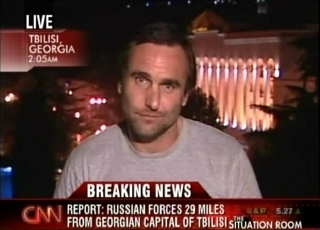TSR: "The Russians are not taking their foot off the accelerator."

Length: 4:44
LARGE (55.0 MB) ----- SMALL (5.7 MB)
Another recap of what the Russians are doing -- or in the case of the withdrawal, not doing -- in the various areas from Tbilisi to the Black Sea.
TOM FOREMAN: Welcome to our viewers in the United States and around the world. The United States is delivering a stern new warning to Russia to get its troops out of Georgia immediately. Secretary of State Condoleezza Rice says a cease-fire signed by the former Soviet republic today clearly has not been honored by Moscow.
Georgia's president signed the cease-fire plan after five hours of talks with Rice in Tbilisi. We're standing by to speak with the president live. Russia's president says he will sign the agreement, too, but, so far, there is no commitment from Moscow about when it will withdraw its forces.
The anger and suffering in Georgia, of course, growing by the day. The U.N. says almost 120,000 people have been uprooted, most of them Georgians, a week after Russia intervened in a dispute over breakaway provinces.
CNN's Michael Ware is in Georgia.
Michael, what's the latest?
MICHAEL WARE, CNN CORRESPONDENT: Tom, the latest is that the Russians are not taking their foot off the accelerator. They're simply not listening to Washington. They're not listening to the sharpened rhetoric. And to be honest, there is no incentive for them to do so.
What we know is that, you know, from the beginning, Russia attacked. They invaded Georgia across two fronts. And on both of those fronts, they're actually defying the international community and America's wishes for them to withdraw.
On the eastern front, they have done anything but pull back. Indeed, they have advanced closer to the capital, Tbilisi, where Secretary of State Condoleezza Rice visited this afternoon, than they have ever been in this conflict. They're barely 29 miles from where I'm standing right now.
Meanwhile, on the western front, where we visited today, we found that, although the key seaport of Poti was not under Russian occupation, as many had thought, there was a Russian presence. They sank a number of Georgian navy and coast guard vessels. And they had been conducting armored patrols through that city.
By and large, they had not disrupted the population, nor attacked the infrastructure. And, indeed, this evening, Georgian officials have announced that they believe those Russian forces, as small as they were, have left that city.
On the other hand, much more disturbing is that, as we explored the western front line this afternoon, we found a significant Russian force not withdrawing, but, in fact, digging in deep within undisputed Georgian territory.
So, despite the calls from Washington, we found Russian artillery in entrenched positions with fresh-cut foliage as camouflage. We saw numerous tanks and armored vehicles from the Russian army, and literally hundreds of soldiers who appear to have all but taken up residence at a makeshift barracks. This is in a key position that allows them to dominate much of western Georgia. So, we can see that the Russians are not backing off at all, Tom.
FOREMAN: Do you have any sign of where the Georgian military is in the middle of all of this? You're talking about where all the Russians are.
WARE: Well, the Georgian military barely has been in this fight from the beginning, I'm afraid to say, Tom.
Despite several years of U.S. sponsorship and aid, the presence of more than 100 U.S. advisers, and, indeed, their participation in the coalition in Iraq, the Georgian military is barely able to defend itself.
In the initial attack, the Georgian military went into one of the disputed territory, where there are pro-Russian separatists, to try and quell an artillery barrage and ongoing attacks. That was precisely the provocation that Russia needed, to not only invade that part of Georgia, but another disputed territory which contains pro- Russian separatists.
And in neither of these areas were the Georgian military able to stop the Russians. Indeed, they had to retreat. And, to this day, Russia controls the areas that it's in without any challenge whatsoever from the Georgians or indeed from the U.S. -- Tom.
FOREMAN: Michael, I'm afraid we're going to have to move on. Thanks so much for your report.
